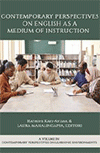
Contemporary Perspectives on English as a Medium of Instruction
Edited by:
Hayriye Kayi-Aydar, University of Arizona
Laura Mahalingappa, University of Maryland
A volume in the series: Contemporary Perspectives on Learning Environments. Editor(s): Erin A. Mikulec, Illinois State University. Hayriye Kayi-Aydar, University of Arizona.
Published 2024
English Medium Instruction (EMI) is the use of English to teach academic content in countries where English is not the first language. There continues to be a rapid growth in EMI around the globe and there is often official government support for EMI programs or curriculum. The goal of this volume is to explore current perspectives on EMI from empirical data to theoretical considerations in order to identify strengths and shortcomings of EMI programs and/or curricula, defining ideologies, and dominant methodologies in diverse contexts and offer evidence-based implications for classroom practice, policy, and future research. The chapters reflect the voices of diverse groups of people (e.g., content instructors, classroom teachers, college students, parents, teacher educators, etc.) who experience EMI in their current educational environments in different countries.
CONTENTS
Acknowledgments. Introduction, Hayriye Kayi-Aydar and Laura Mahalingappa. Content Instructors’ Views on English and Collaboration in EMI: A Discipline-Based Analysis, Dogan Yuksel and Mehmet Altay. The Linguistic Background, Histories, and Experience of EMI Students in an Italian University, Francesca Costa and Cristina Mariotti. Language Ideologies and the Use of Mother Tongues as the Medium of Instruction and Learning in Namibian Junior Primary Schools: A Case Study, Kelvin Mubiana Katukula, Beatha Set, and John Nyambe. Reconceptualizing the E in EMI in Higher Education: Toward English-Within-Multilingualism as a Medium of Instruction, Tomokazu Ishikawa. English as a Medium of Instruction and Translingual Practices: Reality Versus Dream for South Asian Education System? Shaila Sultana. From Dejima to Sustainable Enclaves of Internationalization: Reframing English-Medium Instruction Programs in Japan, Howard Brown and Annette Bradford. Developing Evaluative Standards for English Medium Instruction in Transnational Higher Education Partnerships, Kate Shea. Curriculum Design for EMI Professional Development in Higher Education, Kerry Pusey. English as Medium of Instruction at Brazilian Universities: Current Challenges and Future Directions, Camila Höfling and Luciana C. de Oliveira. Conclusion, Hayriye Kayi-Aydar and Laura Mahalingappa. Biographies.
-
Paperback979-8-88730-583-7
Web price: $45.04 (Reg. 52.99)
-
Hardcover979-8-88730-584-4
Web price: $80.74 (Reg. 94.99)
- eBook979-8-88730-585-1

- EDU053000 - EDUCATION: Training & Certification
- EDU018000 - EDUCATION: Language Experience Approach
- EDU005000 - EDUCATION: Bilingual Education
-
 A Practical Guide to Exemplary Professional Development Schools
A Practical Guide to Exemplary Professional Development Schools
-
 Cultivating Democratic Literacy Through the Arts
Guiding Preservice Teachers Towards Innovative Learning Spaces in ELA Classrooms
Cultivating Democratic Literacy Through the Arts
Guiding Preservice Teachers Towards Innovative Learning Spaces in ELA Classrooms
-
 Education Abroad
Learning Environments in a Global Context
Education Abroad
Learning Environments in a Global Context
-
 Effective Learning Environments in Higher Education Online Settings
Establishing Social Presence
Effective Learning Environments in Higher Education Online Settings
Establishing Social Presence
-
 Narratives of TESOL Professionals
Experiences Navigating the Doctoral Program
Narratives of TESOL Professionals
Experiences Navigating the Doctoral Program
-
 The AMTE Handbook of Mathematics Teacher Education
Reflection on Past, Present and Future – Paving the Way for the Future of Mathematics Teacher Education, Volume 5
The AMTE Handbook of Mathematics Teacher Education
Reflection on Past, Present and Future – Paving the Way for the Future of Mathematics Teacher Education, Volume 5
-
 The Handbook for Aspiring Higher Education Leaders
The Handbook for Aspiring Higher Education Leaders

